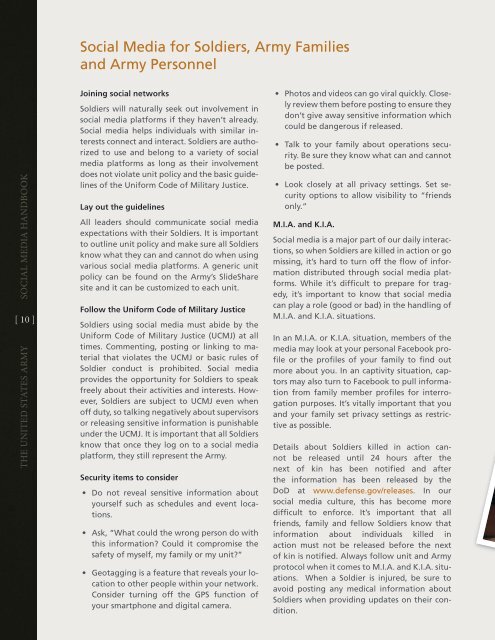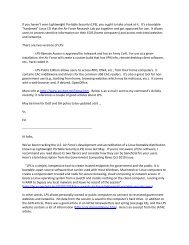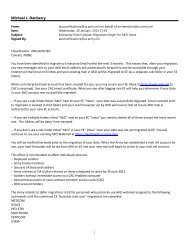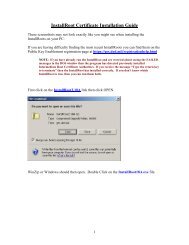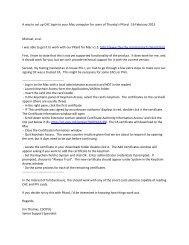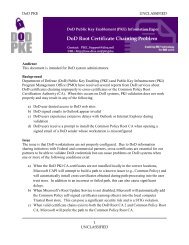U.S. Army Social Media Handbook - 25th Infantry Division - U.S. Army
U.S. Army Social Media Handbook - 25th Infantry Division - U.S. Army
U.S. Army Social Media Handbook - 25th Infantry Division - U.S. Army
Create successful ePaper yourself
Turn your PDF publications into a flip-book with our unique Google optimized e-Paper software.
<strong>Social</strong> <strong>Media</strong> for Soldiers, <strong>Army</strong> Families<br />
and <strong>Army</strong> Personnel<br />
The United States <strong>Army</strong> social media handbook<br />
[ 10 ]<br />
Joining social networks<br />
Soldiers will naturally seek out involvement in<br />
social media platforms if they haven’t already.<br />
<strong>Social</strong> media helps individuals with similar interests<br />
connect and interact. Soldiers are authorized<br />
to use and belong to a variety of social<br />
media platforms as long as their involvement<br />
does not violate unit policy and the basic guidelines<br />
of the Uniform Code of Military Justice.<br />
Lay out the guidelines<br />
All leaders should communicate social media<br />
expectations with their Soldiers. It is important<br />
to outline unit policy and make sure all Soldiers<br />
know what they can and cannot do when using<br />
various social media platforms. A generic unit<br />
policy can be found on the <strong>Army</strong>’s SlideShare<br />
site and it can be customized to each unit.<br />
Follow the Uniform Code of Military Justice<br />
Soldiers using social media must abide by the<br />
Uniform Code of Military Justice (UCMJ) at all<br />
times. Commenting, posting or linking to material<br />
that violates the UCMJ or basic rules of<br />
Soldier conduct is prohibited. <strong>Social</strong> media<br />
provides the opportunity for Soldiers to speak<br />
freely about their activities and interests. However,<br />
Soldiers are subject to UCMJ even when<br />
off duty, so talking negatively about supervisors<br />
or releasing sensitive information is punishable<br />
under the UCMJ. It is important that all Soldiers<br />
know that once they log on to a social media<br />
platform, they still represent the <strong>Army</strong>.<br />
Security items to consider<br />
• Do not reveal sensitive information about<br />
yourself such as schedules and event locations.<br />
• Ask, “What could the wrong person do with<br />
this information? Could it compromise the<br />
safety of myself, my family or my unit?”<br />
• Geotagging is a feature that reveals your location<br />
to other people within your network.<br />
Consider turning off the GPS function of<br />
your smartphone and digital camera.<br />
• Photos and videos can go viral quickly. Closely<br />
review them before posting to ensure they<br />
don’t give away sensitive information which<br />
could be dangerous if released.<br />
• Talk to your family about operations security.<br />
Be sure they know what can and cannot<br />
be posted.<br />
• Look closely at all privacy settings. Set security<br />
options to allow visibility to “friends<br />
only.”<br />
M.I.A. and K.I.A.<br />
<strong>Social</strong> media is a major part of our daily interactions,<br />
so when Soldiers are killed in action or go<br />
missing, it’s hard to turn off the flow of information<br />
distributed through social media platforms.<br />
While it’s difficult to prepare for tragedy,<br />
it’s important to know that social media<br />
can play a role (good or bad) in the handling of<br />
M.I.A. and K.I.A. situations.<br />
In an M.I.A. or K.I.A. situation, members of the<br />
media may look at your personal Facebook profile<br />
or the profiles of your family to find out<br />
more about you. In an captivity situation, captors<br />
may also turn to Facebook to pull information<br />
from family member profiles for interrogation<br />
purposes. It’s vitally important that you<br />
and your family set privacy settings as restrictive<br />
as possible.<br />
Details about Soldiers killed in action cannot<br />
be released until 24 hours after the<br />
next of kin has been notified and after<br />
the information has been released by the<br />
DoD at www.defense.gov/releases. In our<br />
social media culture, this has become more<br />
difficult to enforce. It’s important that all<br />
friends, family and fellow Soldiers know that<br />
information about individuals killed in<br />
action must not be released before the next<br />
of kin is notified. Always follow unit and <strong>Army</strong><br />
protocol when it comes to M.I.A. and K.I.A. situations.<br />
When a Soldier is injured, be sure to<br />
avoid posting any medical information about<br />
Soldiers when providing updates on their condition.


